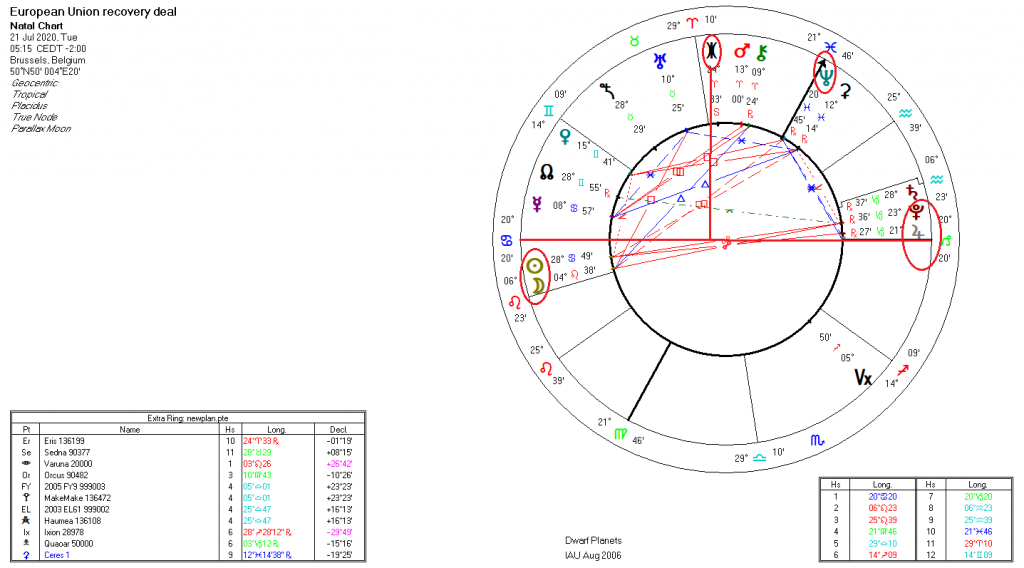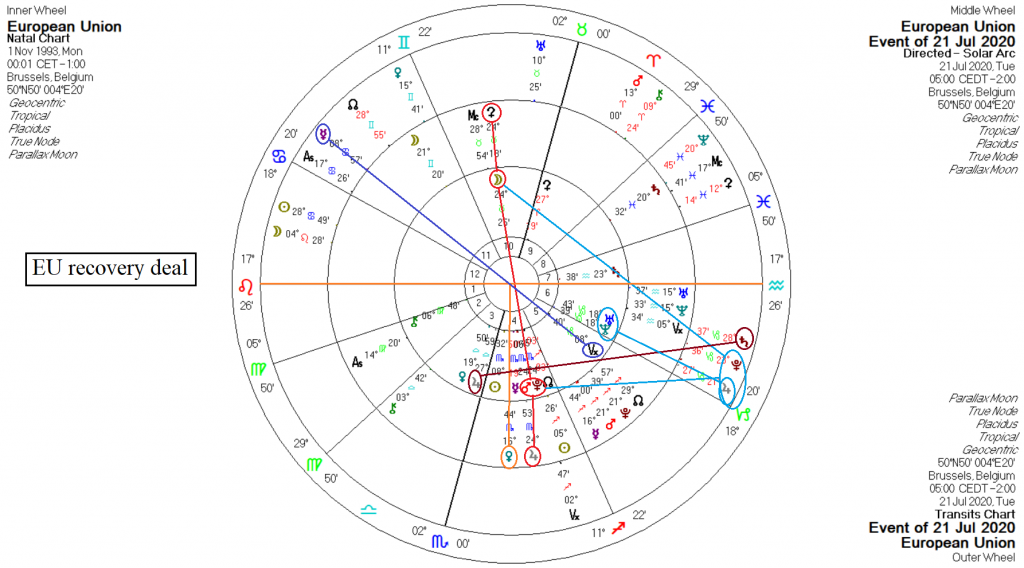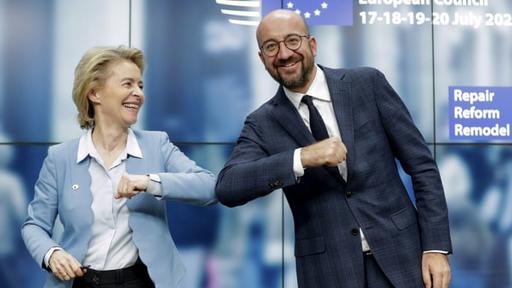Amidst great fanfare it was announced on Tuesday morning that a deal had been struck to salvage the European Union, after 90 hours of fraught negotiations. It was not stated thus, but that is what the agreement amounts to. The European Council President Charles Michel tweeted at the conclusion of the deal, “We did it! We have reached a deal on the recovery package and the European budget for 2021 – 2027. This is a strong deal. And most importantly, the right deal for Europe right now.” Maybe so, but the bill has to pass the EU Parliament, and there will be checks that the money will be well-spent. The UK is not included in the package, since it decided to leave the EU. Will it ultimately be enough to save the EU, is it another version of the Greek bailout, or is it just a temporary band-aid?
The main recipients of the bailout recovery package will be the ‘Club Med’ states, notably Italy and Spain, who were particularly hard-hit by the COVID crisis. The total package amounts to €750 billion ($860 billion+). Of that, Italy is set to receive just over €200 billion, the largest amount of any nation in Europe, with Spain as the second-largest recipient. About 40% of that will go to subsidies and the rest to loans. But strings will be attached, and that is what has many people worried about a repeat of the Greek fiasco. This will be the first instalment of probably several articles about what lies ahead for the EU. We start with the deal itself.
Rabobank, a Dutch multinational banking and financial services company, has the best summary. This deal is said to be a watered-down version of the initial proposal:
This weekend, the heads of state of the 27 EU member states met in Brussels to discuss the revamped EUR 1074bn multi-annual financial framework (MFF) and the EUR 750bn ‘Next Generation EU’ stimulus package. The revamped MFF and the recovery package, aimed at mitigating the economic damage of the COVID-19 crisis, spurred the debate on European solidarity in the past months.
European Council chairman Charles Michel has met with each prime minster and president bilaterally in an effort to get everyone on board. Additionally, a number of leaders, such as chancellor Merkel, president Macron and prime minister Conte have met with the Dutch Prime Minister Rutte, leader of the Frugal Four (Netherlands, Denmark, Sweden, Austria), in attempts to persuade the Dutchman to soften his stance towards the deal. The four member states have expressed their concern over the initial conditions of the package. Specifically the notion of grants and the governance of the fund.
Michel unveiled his new proposal on July 10. The plan closely resembled the original plan of the Commission but shifted some of the governance of the fund towards the European Council (and thus the heads of state) and away from the European Commission. Reform plans can now be passed by a qualified majority in the European Council.
There were four main sticking points to the deal, voiced largely by the ‘Frugal Four’ (Austria, the Netherlands, Denmark and Sweden) and the Visegrad states, who have warned that the spending must be responsible. Italians bristle at that sort of talk. Merkel and Conte have warned them about cuts to the coronavirus response. Those four points were, from the same article:
- Frugal leaders argued that countries would have been able to fend for themselves if they have had sound government finances
- Governance of the fund was a major issue of disagreement…emphasized the importance of economic reforms, especially for the Southern member states…the Frugals wanted to have a say in how the funds are spent. Southern states are wary of that.
- The distribution key was controversial. The initial proposal was based on the size of the economy (GDP), the level of wealth (GDP per capita and) and the historical long-term unemployment. This means that countries with a low GDP per capita and countries with a high historical unemployment would benefit the most.
- Including the rule of law in the distribution key was a thorn in the side of Eastern European countries, such as Poland and Hungary
The deal was concluded and put forward at 5:15 am Brussels time. The chart for the deal is below (bigger):

As the saying goes, the devil is in the detail when it comes to deals and contracts. The lawyers will have fun with this one. Yes, it is a historic deal, as Macron has said, but we are still in the preliminary phases. No money has changed hands yet and the deal has not been made law, and still quite a bit can happen in between. That said, without this deal or something similar, the EU was headed for a breakup. We will look at that in a future posting.
On the surface this looks like a good outcome. We find a Jupiter/Pluto conjunction on the Descendant (a contract/agreement involving a lot of money), but there is a caution there as well. The Jupiter/Pluto conjunction also represents plutocrats/oligarchs, who may be gaming this for their own ends.
However, the Cancer rising gives an impetus toward the public good (Cancer rules the masses), with the Sun and Moon in mutual reception, conjunct in the 1st house (just after the new moon on the 20th). This in itself is a positive indicator. The Moon is trine Chiron, bringing healing for the EU, but at the same time is opposite Saturn and square to Uranus. That is a double-edged sword.
On the one hand the Moon opposite Saturn gives a great concentrative ability and the ability to learn deeply through experience. But it is not a ‘touchy-feely’ aspect and brings with it some hard lessons. Experience is what you get when you don’t get what you want, as the saying goes. That opposition is indicative of the conditions that are being placed on the package by the Frugal Four.
The square to Uranus can bring a very strident tone and heighten emotional tensions among the bloc. That is moderated by the Moon/Saturn opposition. Otherwise, the Moon/Uranus square shows the concern for those less fortunate, highlights the ideals and individuality of the bloc and otherwise adds to the intellectual force needed to iron out the details. In all, the two squares show an innate capacity with this deal to push through the needed aid and to stand against the nay-sayers who would otherwise seek to undermine it.
The strident nature of the negotiations is shown by the Mercury/Mars square. Mercury rules the 12th house (institutions, hidden enemies of the state, but also hidden help), but it is sextile to Uranus, showing the independence of the bloc and the humanitarian import of the deal, giving a broad-minded outlook and the inventive ability to be able to work out the details in the coming months.
But, speaking of the devil in the details, we find Neptune, ruling the 10th house, conjunct the MC in the 9th, sextile to Jupiter but square to Venus. That Venus square brings a note of caution with it, because it can indicate treacherous and/or unreliable friends and an unsound idealism that can intrude on an otherwise sound foundation. With Neptune on the MC and in the 9th it may be an indication of secret foreign influence, i.e., the United States. That there is a sound foundation is shown by the sextile to Jupiter, which aids the financial side of matters and gives an intuitive approach to finances.
Then we get to the main part of the deal, which is the loan aspect, ruled by the 8th house. That is ruled by Aquarius and Uranus. The general indication is that the loans will go through and will benefit the EU bloc, especially seeing that Uranus is placed in the 11th house (friends and the desires of the bloc). And, Uranus receives a sextile from Ceres, indicating both a positive turning point and that the supply of ‘nourishment’ for the EU will go ahead.
The bottom line? – This is a good deal, but it is subject to sabotage by unreliable players within the bloc and from meddling by foreign concerns (Mercury in the 12th, squaring Mars in the 10th). And that brings up a salient point. It throws a big challenge to the members of the bloc to put their money where their mouths are and also to the United States. This is shown by the square of Eris to the deal horizon axis. The EU needn’t worry about Russia or China. Quite the contrary.
Unless this deal goes through and reinforces the finances and solidarity within the EU, the bloc is left open to the vagaries of the United States, which is already displaying hostility toward Germany over Nordstream II, has pressured France to drop cooperation on 5G with Huawei and has control in general over the bloc via the undue influence of the NATO, quite aside from the bloc being tied to the US dollar and the SWIFT mechanism. Washington does not want the EU as an economic competitor, especially given the current climate within the US itself. As for Russia and China, they are quite happy to do business with the EU.
Then, we need to place the chart for the deal in reference to the EU itself. The chart for the EU with directions and transits is below (bigger):

With Macron’s statement that this is a historic deal and others marking it as a turning point for the bloc, that is indeed shown in the chart. Most notable are the directions of Ceres to the EU Moon, the latter ruling the EU 12th house, and Jupiter to the EU Mars/Pluto conjunction. This shows the big money available, the turning point for the bloc, the safeguarding of its infrastructure and support for its populace (Jupiter to Mars/Pluto in the 4th house), and then by transiting Jupiter hovering around a sextile to the Mars/Pluto conjunction. In all, this shows a powerful change, as well as countering quite a bit of antagonistic energy shown by the natal EU Moon opposite the natal EU Mars/Pluto conjunction.
We see transiting Mercury on the EU Antivertex – the announcement of a deal among friends (Mercury transiting the 11th house). Transiting Pluto is trine the EU Moon from the 6th house (the ‘health house’, re: COVID-19), bolstering EU institutions, especially its health services. Transiting Saturn is square the EU Jupiter, showing the seriousness of the matter and also the budgeting that will be needed as well as the conditions placed on the bloc.
Finally, we have the directed Venus square the EU Horizon axis from the 4th house, again highlighting the general public and infrastructure. In all, we would be inclined to agree from the astrology with the pronouncement of Charles Michel, that this was the right deal for Europe, right now.
The deal will not be all wine and roses. It was hard fought and contested at times by various nations, especially the Frugals and the Visegrad states, to whom this deal is a considerable rapprochement. Everyone has gained something, and everyone has had to accept conditions. But in all, it appears to be a win-win for the bloc as a whole. We’ll see how the years ahead pan out, so long as there is not another pandemic or a resurgence of this one in the winter.
We keep in mind, too, that what we are looking at here is an agreement, not a firm legislation. There will be another chart for that. Quite a lot can changed between now and when the legislation is passed.
It will take time for the funds to be disbursed and the deal will likely not be ratified before January of 2021. The concessions made to the Visegrad and Frugals were as follows, from the Rabobank article:
- The overall size of the fund has remained the same but the composition has shifted from EUR500bn in grants to EUR390bn in grants.
- The Frugals receive higher rebates on their EU contributions and a bigger role in the governance of the fund.
- Disbursement of funds for proposed investment plans have to be ratified by a qualified majority. Member states can object to funds being disbursed within 3 months after acceptance. The final decision is formally up to the European Commission.
- As for the rule of law, Poland’s Mateusz Morawiecki asserted that there is no direct link between the rule of law and the funds in the deal. The mechanism has yet to be created by a group headed by Chancellor Merkel and is to be accepted by the European Council later on. Since the Council requires unanimity, Poland and Hungary can veto disadvantageous proposals.
So, we can see that not everything will be smooth sailing. There is a north-south division and an east-west division culturally within the bloc that can be problematic at times. But what this deal shows is that there can be solidarity within the EU, much as the doom-sayers were forecasting a breakup of the EU. And as it stands, the UK has missed out. They could have been a part of this and benefited from it.
For now, the EU can breathe easier, so long as the pandemic can be kept under control. Then, they will have to come to terms with the United States and the animosity that exists between the US and China and the US and Russia. For their part, many Europeans are seeing that perhaps it is not the best idea to have Russia as an enemy, and that Washington is not perhaps the best friend in the world. Once the election passes in the US tensions may abate for a bit, but it is not a good idea to place too much stock in that. And if the US suffers a large collapse, as is looking increasingly likely, then Europe will need to be able to stand on its own.
From the astrology, we can be cautiously optimistic about the immediate future for the EU. There is still the matter of sanctions against Russia, which Germany and the Italians especially would like to see resolved. Both nations have industrial and financial interests with the Russians. And as for China, the Club Med states have interests there, too.
The future for the EU can be promising, or it can turn sour quickly. Much will depend upon how independently the EU can stand against external pressures and keep its house in order Challenges lie immediately ahead. But if this deal is any indication, those will not be insuperable and can bolster the security and standing of the bloc. This deal is a good first step.
Featured pic from News Break

